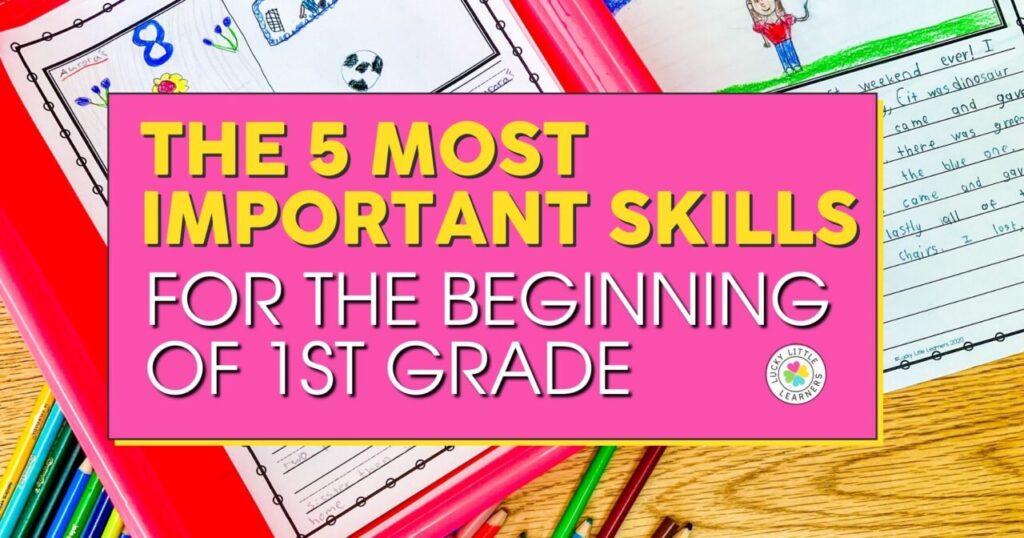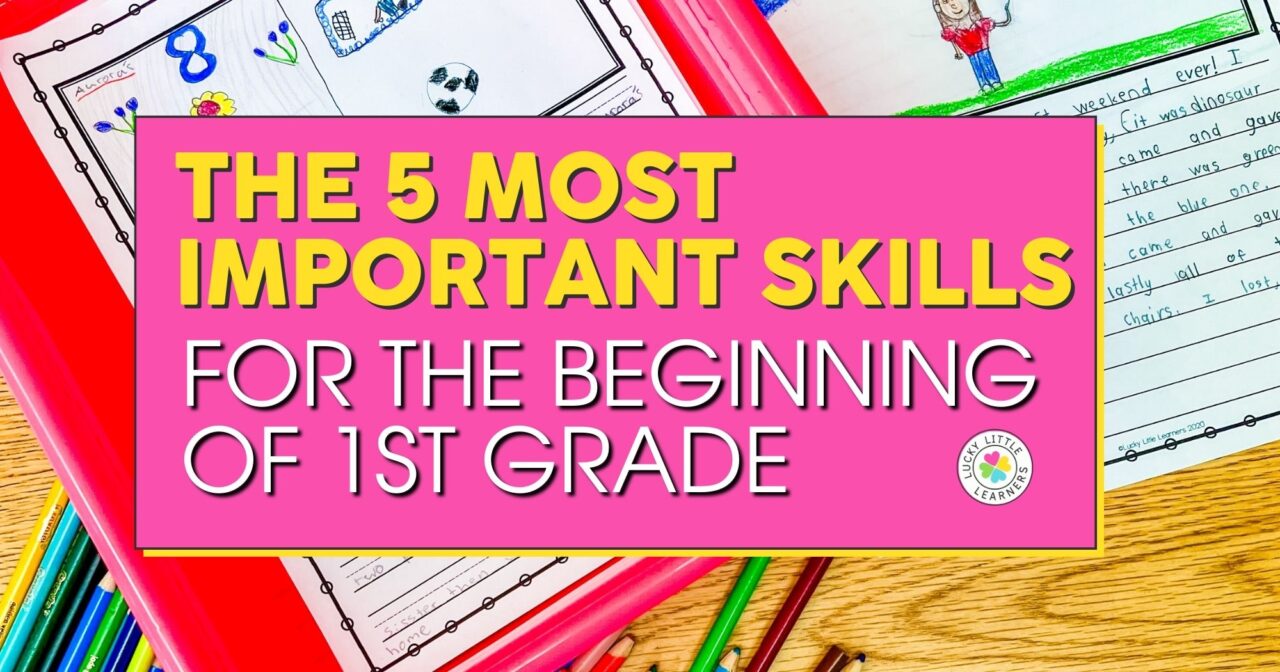
Essential Things a 1st Grader Should Know: A Comprehensive Guide
Entering first grade is a significant milestone in a child’s educational journey. It’s a year of considerable growth, where they build upon the foundational skills acquired in kindergarten and embark on more complex learning. Understanding what things a 1st grader should know helps parents and educators support their development effectively. This guide outlines the key areas of knowledge and skills that are typically expected of a first grader, providing a comprehensive overview of what to anticipate and how to assist in their learning process.
Literacy Skills
Literacy forms the cornerstone of academic success. First graders are expected to significantly improve their reading and writing abilities. Here’s what falls under literacy skills, and why it’s vital things a 1st grader should know.
Reading Comprehension
By the end of first grade, children should be able to read simple stories and understand the main idea, characters, and plot. They should also be able to answer questions about the story, demonstrating their comprehension. This involves:
- Decoding words: Using phonics to sound out unfamiliar words.
- Identifying main ideas: Understanding the central theme of a story.
- Making inferences: Drawing conclusions based on the text.
Phonics and Word Recognition
A strong understanding of phonics is crucial. First graders should be able to recognize and produce the sounds of letters and letter combinations. They should also be able to blend these sounds to read words. Key phonics skills include:
- Consonant blends and digraphs: Understanding combinations like ‘bl,’ ‘ch,’ and ‘sh.’
- Vowel sounds: Recognizing short and long vowel sounds.
- Sight words: Memorizing common words like ‘the,’ ‘and,’ and ‘said’ for quick recognition.
Writing Skills
First graders should be able to write simple sentences with correct capitalization and punctuation. They should also be able to express their ideas clearly in writing. Important writing skills include:
- Sentence structure: Forming complete sentences with a subject and a predicate.
- Punctuation: Using periods, question marks, and exclamation points correctly.
- Capitalization: Capitalizing the first word of a sentence and proper nouns.
Mathematical Concepts
Mathematics is another critical area of focus in first grade. Children build upon their understanding of numbers and begin to learn more complex concepts. These are critical things a 1st grader should know.
Number Sense
First graders should have a solid understanding of numbers up to 100. This includes:
- Counting: Counting forward and backward from any number within 100.
- Number recognition: Identifying and writing numbers.
- Place value: Understanding the value of digits in the ones and tens places.
Addition and Subtraction
First graders should be able to add and subtract numbers within 20 fluently. This involves:
- Basic facts: Memorizing addition and subtraction facts (e.g., 5 + 3 = 8, 10 – 4 = 6).
- Problem-solving: Solving simple word problems involving addition and subtraction.
- Strategies: Using strategies like counting on, counting back, and using manipulatives.
Geometry and Measurement
First graders are introduced to basic geometric shapes and measurement concepts. Key skills include:
- Identifying shapes: Recognizing and naming common shapes like circles, squares, triangles, and rectangles.
- Measuring length: Using non-standard units (e.g., paper clips, cubes) to measure the length of objects.
- Telling time: Telling time to the hour and half-hour.
Science and Social Studies
While not always as heavily emphasized as literacy and math, science and social studies introduce first graders to the world around them. It is important things a 1st grader should know.
Basic Science Concepts
First graders learn about basic science topics such as:
- Living things: Understanding the characteristics of plants and animals.
- The environment: Learning about different habitats and ecosystems.
- Weather: Identifying different types of weather and their effects.
Social Studies Basics
In social studies, first graders are introduced to concepts such as:
- Community: Understanding the roles of different people in a community.
- History: Learning about important historical figures and events.
- Geography: Identifying basic geographical features like continents and oceans.
Social and Emotional Skills
Beyond academics, social and emotional skills are crucial for a child’s overall development. These things a 1st grader should know contribute to their ability to interact positively with others and navigate their emotions.
Cooperation and Collaboration
First graders should be able to work cooperatively with their peers in group activities. This includes:
- Sharing: Sharing materials and resources with others.
- Taking turns: Waiting patiently for their turn to speak or participate.
- Listening: Paying attention to what others are saying.
Emotional Regulation
First graders are learning to manage their emotions and express them appropriately. This involves:
- Identifying emotions: Recognizing and naming different emotions (e.g., happiness, sadness, anger).
- Expressing feelings: Communicating their feelings in a healthy way.
- Coping strategies: Using strategies like deep breathing or talking to a trusted adult to manage difficult emotions.
Problem-Solving
First graders should be able to solve simple problems independently or with guidance. This includes:
- Identifying problems: Recognizing when there is a problem.
- Brainstorming solutions: Coming up with different ways to solve the problem.
- Choosing a solution: Selecting the best solution and trying it out.
Practical Life Skills
Practical life skills are essential for independence and self-sufficiency. These are important things a 1st grader should know to function effectively in their daily lives.
Personal Hygiene
First graders should practice good personal hygiene habits, such as:
- Handwashing: Washing their hands regularly, especially before meals and after using the restroom.
- Brushing teeth: Brushing their teeth twice a day.
- Dressing themselves: Putting on and taking off their clothes independently.
Following Instructions
First graders should be able to follow simple instructions given by adults. This includes:
- Listening attentively: Paying attention to the instructions being given.
- Understanding directions: Comprehending what they are being asked to do.
- Completing tasks: Following through with the instructions to complete the task.
Responsibility
First graders can begin to take on small responsibilities, such as:
- Cleaning up: Helping to tidy up their toys and belongings.
- Caring for pets: Assisting with feeding or walking pets.
- Completing chores: Doing simple chores around the house.
How to Support First Graders
Parents and educators play a crucial role in supporting first graders’ learning and development. Here are some tips for helping them succeed:
- Create a supportive environment: Provide a safe and nurturing environment where children feel comfortable taking risks and asking questions.
- Read aloud: Read aloud to children regularly to expose them to new vocabulary and ideas.
- Practice skills: Provide opportunities for children to practice their skills through games, activities, and homework.
- Encourage curiosity: Encourage children to explore their interests and ask questions about the world around them.
- Communicate with teachers: Stay in communication with teachers to stay informed about children’s progress and address any concerns.
First grade is a pivotal year for children as they build upon their existing knowledge and acquire new skills. By understanding what things a 1st grader should know, parents and educators can provide targeted support and create a positive learning environment. This comprehensive guide provides a roadmap for the key areas of development, including literacy, mathematics, science, social studies, social-emotional skills, and practical life skills. By focusing on these areas, we can help first graders thrive and reach their full potential. Supporting these essential things a 1st grader should know will set them up for future success. Remember that every child learns at their own pace, and patience and encouragement are key. Recognizing the important things a 1st grader should know, and fostering a love of learning, will set your child on a path for lifelong success. It’s important to continuously reinforce these things a 1st grader should know through engaging activities and consistent support. Keep in mind that understanding things a 1st grader should know is a collaborative effort involving parents, teachers, and the child themselves. When everyone works together, the child is more likely to succeed. Focusing on these things a 1st grader should know ensures a well-rounded education. By mastering these things a 1st grader should know, children are prepared for the challenges of higher grades. Continually assessing their grasp of things a 1st grader should know helps tailor the learning experience. The more these things a 1st grader should know are reinforced, the more confident they will become. Celebrate the small victories as they learn these things a 1st grader should know. Mastering these things a 1st grader should know builds a strong foundation for future learning. It’s essential to make learning these things a 1st grader should know fun and engaging. Remember to be patient as they learn these things a 1st grader should know.
[See also: Reading Comprehension Strategies for First Grade]
[See also: Fun Math Activities for First Graders]

